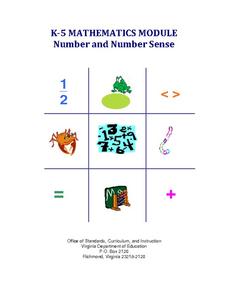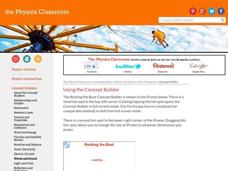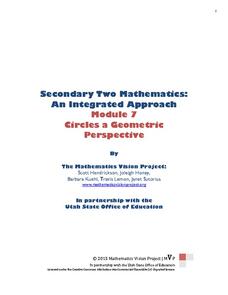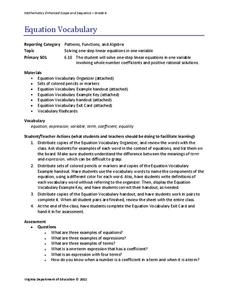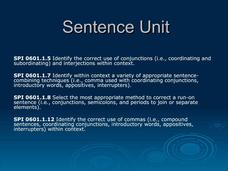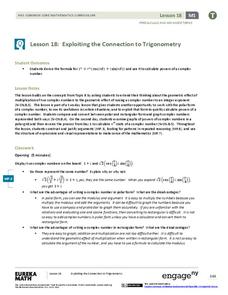Willow Tree
Patterns - Numbers, Shapes, etc.
Find the pattern is the name of the game! Learners examine different patterns represented by numbers, shapes, and words. They must describe the pattern, predict the result in a given position, and find an equation that...
Baylor College
Living Things and Their Needs: The Math Link
Enrich your study of living things with these cross-curricular math activities. Following along with the story Tillena Lou's Day in the Sun, learners will practice addition and subtraction, learn how to measure volume and length,...
CK-12 Foundation
Multiplying Matrices by a Scalar: Making Matrix Patterns
Scalar multiplication equations can be a drag. Scholars determine missing matrices to make correct scalar matrix multiplication equations. They place the correct matrix into the equations within the interactive resource and analyze the...
State of Michigan
Pre-K Mathematics
Kick-start children's education with this pre-school math unit. Offering 31 different hands-on learning activities that develop young mathematicians' pattern and shape recognition, basic number sense, and much more, this is a...
Resources for Educators
Math & Science Connection
Whether you're using a collection of Dr. Seuss books to teach basic math skills like counting, adding, and subtracting, or exploring the different states of matter by melting a crayon with a hairdryer, a series...
Curated OER
K-5 Mathematics Module: Number and Number Sense
Reinforce number sense with a collection of math lessons for kindergarteners through fifth graders. Young mathematicians take part in hands-on activities, learning games, and complete skills-based worksheets to enhance proficiency...
Dr. Seuss Enterprises
Read Across America
Celebrate the whimsical world of Dr. Seuss on Read Across America Day with a collection of science, technology, engineering, the arts, and mathematics activities, each linked to a popular Dr. Seuss story.
Houghton Mifflin Harcourt
Person to Person: Extra Support Lessons (Theme 4)
Authors use many strategies when writing stories. A series of extra support lessons breaks down those strategies, as well as key grammatical and phonics-based concepts to support struggling learners. The last of three lessons offers...
Physics Classroom
Rocking the Boat
Sometimes it's okay to rock the boat! Science scholars manipulate wave properties using a fun interactive. Part of a larger playlist that dives into waves and sound, the lesson helps users work their way from apprentice to wizard by...
Rational Number Project
Initial Fraction Ideas Lesson 18: Overview
Develop young mathematicians' ability to compare fractions with investigation into the number 1/2. After brainstorming a list of fractions equivalent to 1/2, children identify a pattern in the numerators and...
Cabrillo College
Elementary Algebra
Hello Algebra! If you're in need of a resource with a books worth of examples and practice problems, this is it. Some topics include linear equations, polynomials and exponents, rational expressions, quadratic equations, and a...
Mathematics Vision Project
Quadratic Equations
Through a variety of physical and theoretical situations, learners are led through the development of some of the deepest concepts in high school mathematics. Complex numbers, the fundamental theorem of algebra and rational exponents...
Virginia Department of Education
Relationships Round Robin
Mathematics is all about patterns. Young mathematicians analyze geometric patterns to write algebraic expressions. They use the expressions to predict future stages of the patterns.
Mathematics Vision Project
Circles: A Geometric Perspective
Circles are the foundation of many geometric concepts and extensions - a point that is thoroughly driven home in this extensive unit. Fundamental properties of circles are investigated (including sector area, angle measure, and...
Virginia Department of Education
Equation Vocabulary
You'd feel bad if someone called you by the wrong name — and equations are no different. Young mathematicians learn the vocabulary associated with equations and expressions identifying these components in sample equations.
EngageNY
When Can We Reverse a Transformation? 1
Wait, let's start over — teach your class how to return to the beginning. The first lesson looking at inverse matrices introduces the concept of being able to undo a matrix transformation. Learners work with matrices with a determinant...
Curriculum Corner
“I Can” Common Core! 3rd Grade Math
Help third graders make sense of the Common Core math standards with this simple checklist. By rewording each standard as an I can statement, children are provided with clear goals to focus on as they participate in math lessons.
Willow Tree
Arithmetic and Geometric Sequences
Old mathematicians never die; they just lose some of their functions. Studying sequences gives scholars an opportunity to use a new notation. Learners write functions to model arithmetic and geometric sequences and use them to find new...
West Contra Costa Unified School District
Solving Inequalities
What does translating points on a number line have to do with solving inequalities? Young mathematicians first learn about translations of points on a number line, and then use this information to solve linear inequalities in one variable.
University of Utah
Representations of a Line
Line up to learn about lines! Scholars discover how to express patterns as linear functions. The workbook then covers how to graph and write linear equations in slope-intercept form, as well as how to write equations of...
Book Units Teacher
Sentence Unit
Imagine using history to teach grammar. This 178-slide PowerPoint presents an amazing collection of images and historical information about the settlement of Tennessee and about famous residents like Daniel Boone. Viewers...
West Contra Costa Unified School District
The Power of Ten: Building a Magnitude Model
Add visual representation to teaching place value with a magnitude model. Using adding machine tape, pupils build a linear place value strip from 1 to 100.
Missouri Department of Elementary
What Color is Your Apple?
Build your classroom community with an activity that uses apples to examine oneself and their classmates. Participants draw four large apples on blank paper then exchange them within a small group. Group members write a character trait...
EngageNY
Exploiting the Connection to Trigonometry 1
Class members use the powers of multiplication in the 19th installment of the 32-part unit has individuals to utilize what they know about the multiplication of complex numbers to calculate the integral powers of a complex...





